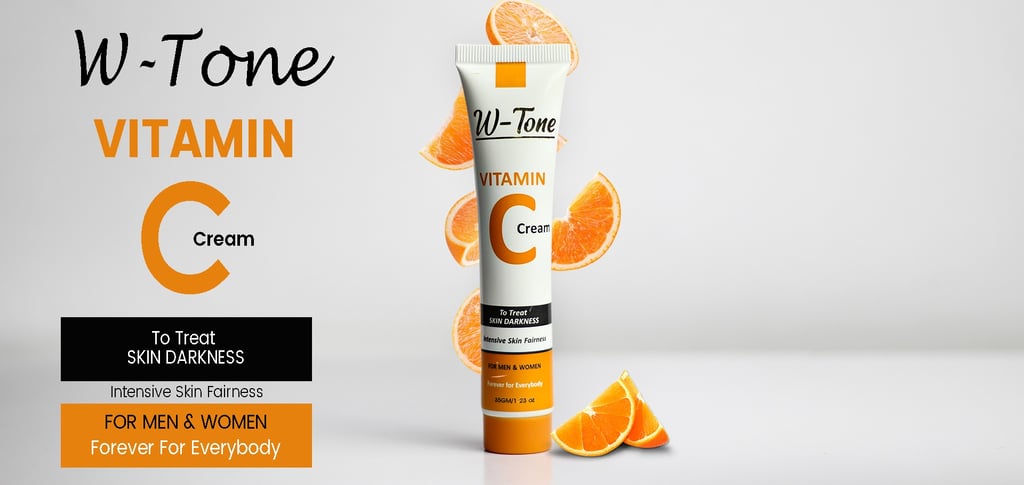Vitamin C Cream: Benefits, Ingredients, Usage, and More
"Discover the benefits of Vitamin C cream for brighter, youthful skin. Learn about key ingredients, usage, expert insights, and how it protects against aging and environmental damage."
2/27/20253 min read


Vitamin C Cream
Vitamin C is a powerhouse ingredient in the skincare world, known for its brightening, anti-aging, and protective properties. One of the most effective ways to incorporate this nutrient into your skincare routine is through Vitamin C cream. This article explores the benefits of Vitamin C cream, its key ingredients, how it works, proper usage, potential side effects, and how it compares to other skincare ingredients.
Benefits of Vitamin C Cream for Skin
Brightens Skin Tone: Vitamin C inhibits melanin production, helping to fade dark spots, hyperpigmentation, and discoloration, resulting in a more even skin tone.
Reduces Wrinkles and Fine lines As a potent antioxidant, Vitamin C stimulates collagen synthesis, improving skin elasticity and reducing signs of aging.
Protects Against Environmental Damage: Vitamin C neutralizes free radicals from UV exposure and pollution, preventing premature aging and oxidative stress.
Boosts Skin Hydration: Some Vitamin C creams are formulated with hydrating agents like hyaluronic acid, ensuring skin remains plump and moisturized.
Enhances Wound Healing: Vitamin C plays a crucial role in the skin’s repair process, aiding in the healing of scars and minor skin injuries.
Key Ingredients in Vitamin C Cream
Ascorbic Acid: The purest and most potent form of Vitamin C, known for its effectiveness in brightening and collagen production.
Sodium Ascorbyl Phosphate: A stable, water-soluble derivative that is gentler on sensitive skin.
Hyaluronic Acid: Often added to Vitamin C creams for enhanced hydration and skin-plumping effects.
Vitamin E works synergistically with Vitamin C to enhance antioxidant protection and skin repair.
Ferulic acid stabilizes Vitamin C and boosts its effectiveness, making it more resilient to oxidation.
How Vitamin C Cream Works
Vitamin C cream penetrates the epidermis, where it neutralizes free radicals, stimulates collagen production, and inhibits melanin overproduction. Its antioxidant properties protect skin cells from oxidative stress, which is a major contributor to premature aging. Unlike serums, which are lightweight and penetrate deeper, Vitamin C creams offer hydration and prolonged skin contact, making them ideal for daily moisturizing.
How to Use Vitamin C Cream
Cleanse Your Skin: Start with a gentle cleanser to remove dirt and impurities.
Apply Toner (Optional)—Prepares the skin for better absorption.
Apply Vitamin C cream. Use a pea-sized amount and gently massage it into the skin using upward motions.
Follow with Sunscreen (morning routine): Vitamin C enhances sun protection but does not replace sunscreen.
Use daily for best results. Consistency is key for noticeable improvements.
Potential Side Effects and Precautions
Mild Irritation: Some individuals may experience redness, tingling, or slight peeling, especially with high concentrations.
Sensitivity to Sunlight: While Vitamin C offers protection against UV damage, it is still essential to use sunscreen daily.
Allergic Reactions: Rare, but individuals with sensitive skin should do a patch test before full application.
Oxidation Risk: Vitamin C degrades when exposed to air and light, so it’s important to store the cream in an airtight, dark container.
Vitamin C vs. Other Skincare Ingredients
Vitamin C vs. Retinol: Retinol is excellent for cell turnover and acne, while Vitamin C focuses on brightening and protection.
Vitamin C vs. Niacinamide Both help with pigmentation, but niacinamide also controls serum production and soothes inflammation.
Vitamin C vs. Hyaluronic Acid: Hyaluronic acid hydrates and plumps skin, complementing Vitamin C’s antioxidant properties.
Expert Opinions and Scientific Insights
Dermatologists widely recommend Vitamin C for its anti-aging and brightening benefits. A study published in the Journal of Clinical and Aesthetic Dermatology confirms that topical Vitamin C significantly improves skin texture, reduces fine lines, and protects against UV-induced damage. Experts also emphasize that combining Vitamin C with Vitamin E and Ferulic Acid enhances stability and effectiveness.
Why Vitamin C Cream is Essential for Skincare
Vitamin C cream is an indispensable part of any skincare routine due to its multiple benefits, including brightening, anti-aging, and protection against environmental stressors. By choosing the right formulation and using it consistently, you can achieve radiant, youthful skin. Whether used alone or in combination with other powerful skincare ingredients, Vitamin C cream remains a gold standard in skincare science.
"Try Proclera’s W Tone Vitamin C Cream today for brighter, youthful skin with powerful antioxidant protection and deep hydration!"
